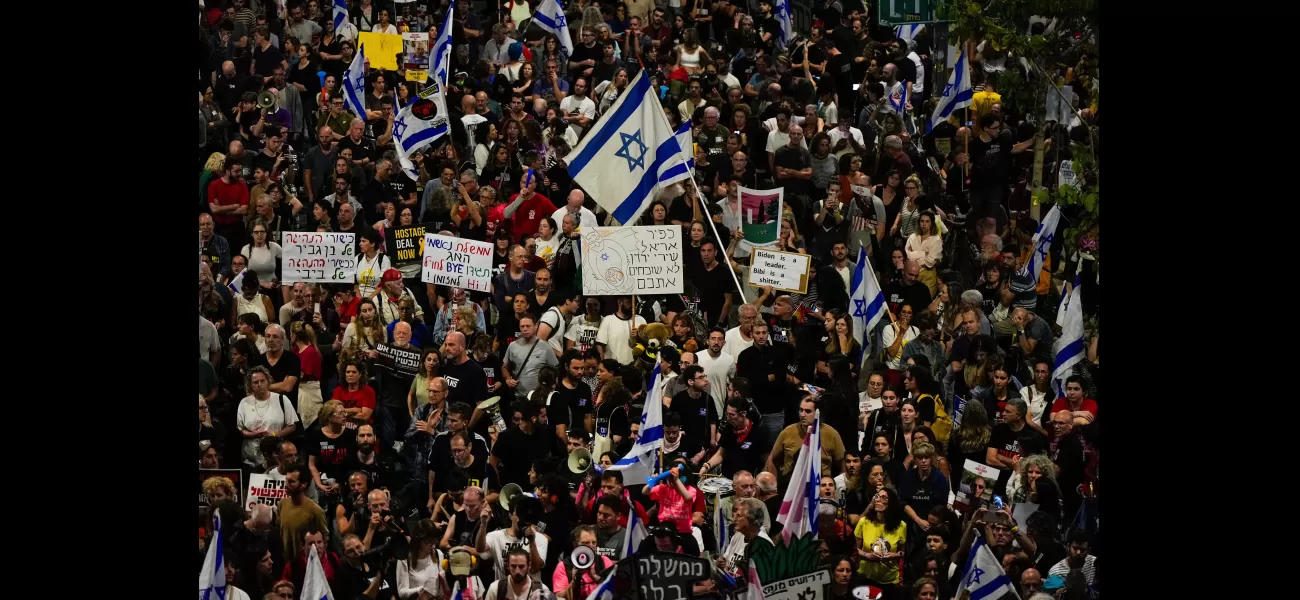Presidents Biden and Netanyahu discuss amid mounting pressure for Israel and Hamas to agree on a cease-fire.
Biden spoke with Netanyahu as pressure grows for a deal to end the Israel-Hamas conflict and free Israeli hostages after nearly 7 months of war in Gaza.
April 28th 2024.

On Sunday, the White House announced that President Joe Biden had once again spoken with Israeli Prime Minister Benjamin Netanyahu. The two leaders discussed the ongoing conflict between Israel and Hamas, with mounting pressure for a resolution that would secure the release of Israeli hostages and bring about a cease-fire after nearly seven months of war in Gaza.
According to the statement, Biden reiterated his stance on the situation, expressing concern over Israel's plans to invade Gaza's southern city of Rafah despite global outcry and the presence of over 1 million Palestinian civilians seeking shelter there. The United States stands against this invasion on humanitarian grounds, which has caused some strain in the relationship between the two allies. In response to the escalating tensions, U.S. Secretary of State Antony Blinken will be returning to the Middle East on Monday.
During their conversation, Biden also emphasized the need for sustained and enhanced delivery of humanitarian aid to Gaza. However, this statement was not as strong as their previous call this month, in which Biden warned that U.S. support for Israel in the conflict would depend on swift action to protect civilians and aid workers. So far, there has been no comment from Netanyahu's office on the latest call.
Meanwhile, a senior official from Qatar, a key intermediary in the negotiations, urged both Israel and Hamas to show more commitment and seriousness in their talks. Qatar, which hosts Hamas' headquarters in Doha, played a crucial role in securing a brief halt to the fighting in November, which resulted in the release of dozens of hostages. However, in a sign of frustration, Qatar has recently stated that it is reassessing its role in the negotiations.
It has been reported that an Israeli delegation will be visiting Egypt in the coming days to discuss the latest proposals in the negotiations. Additionally, a Hamas delegation will also be heading to Cairo. According to Egypt's state-owned Al Qahera News satellite television channel, the Hamas delegation is expected to arrive on Monday.
In interviews with the liberal daily Haaretz and Israeli public broadcaster Kan, Qatar's Foreign Ministry spokesperson Majed al-Ansari expressed disappointment with both Hamas and Israel. He stated that both sides have made decisions based on political interests rather than the well-being of civilians. Al-Ansari did not provide details on the talks but mentioned that they have "effectively stopped" as both sides remain entrenched in their positions.
These comments come after an Egyptian delegation discussed with Israeli officials a "new vision" for a prolonged cease-fire in Gaza. According to an Egyptian official who spoke on condition of anonymity, Israeli officials are open to discussing a permanent cease-fire as part of the second phase of a deal. However, Israel has made it clear that it will not end the war until it defeats Hamas.
The second phase of the deal would commence after the release of civilian and sick hostages and would include negotiations for the release of Israeli soldiers. In addition, senior Palestinian prisoners would be released, and a reconstruction process would be launched. Earlier this month, the negotiations centered around a six-week cease-fire proposal, with Hamas agreeing to release 40 civilian and sick hostages in exchange for the release of hundreds of Palestinian prisoners in Israeli jails.
In a letter written by Biden and 17 other world leaders, Hamas was urged to release their citizens immediately. In recent days, Hamas has released videos of three hostages, seemingly as a way to push for concessions from Israel. The mounting pressure for a cease-fire deal between the two sides is also aimed at preventing an Israeli attack on Rafah, the city on the border with Egypt where more than half of Gaza's population is seeking shelter. Israel has gathered dozens of tanks and armored vehicles in preparation for this invasion, causing global alarm.
Palestinian President Mahmoud Abbas addressed the World Economic Forum in Saudi Arabia, stating that "only a small strike is all it takes to force everyone to leave Palestine." He added that he believes an invasion will occur within days. However, White House national security spokesman John Kirby told ABC that Israel has assured the U.S. that they will not go into Rafah until they have had a chance to discuss their concerns and perspectives. The Israeli troop buildup may also be a tactic to pressure Hamas in the negotiations, as they see Rafah as the last major stronghold of the group. Israel has vowed to destroy Hamas' military and governing capabilities.
Aid groups have warned that an invasion of Rafah would worsen the already dire humanitarian situation in Gaza, where hunger is widespread. On Sunday, the United Arab Emirates announced that 400 tons of aid had arrived at the Israeli port of Ashdod, the largest shipment yet by sea via Cyprus. It is unclear how and when this aid will be delivered to Gaza. Additionally, World Central Kitchen announced that they will resume operations in Gaza on Monday, after a four-week suspension due to seven of their aid workers being killed by Israeli military drones. The organization has 276 trucks ready to enter through the Rafah crossing and is also exploring the possibility of using the Ashdod port to offload supplies.
The war between Israel and Hamas was sparked by Hamas' attack on October 7, which resulted in the deaths of 1,200 people, mostly civilians, according to Israeli authorities. They also state that another 250 people were taken hostage. As a response, Israel launched a retaliatory assault on Hamas, which has resulted in the deaths of more than 34,000 people, most of them women and children, according to health authorities in Gaza. The Israeli military blames Hamas for civilian casualties, accusing them of using residential and public areas as cover. They claim to have killed at least 12,000 fighters, although no evidence has been provided to support this claim. Reporting for this article was done by Jon Gambrell from Jerusalem, Samy Magdy from Cairo, and Ellen Knickmeyer from Washington.
According to the statement, Biden reiterated his stance on the situation, expressing concern over Israel's plans to invade Gaza's southern city of Rafah despite global outcry and the presence of over 1 million Palestinian civilians seeking shelter there. The United States stands against this invasion on humanitarian grounds, which has caused some strain in the relationship between the two allies. In response to the escalating tensions, U.S. Secretary of State Antony Blinken will be returning to the Middle East on Monday.
During their conversation, Biden also emphasized the need for sustained and enhanced delivery of humanitarian aid to Gaza. However, this statement was not as strong as their previous call this month, in which Biden warned that U.S. support for Israel in the conflict would depend on swift action to protect civilians and aid workers. So far, there has been no comment from Netanyahu's office on the latest call.
Meanwhile, a senior official from Qatar, a key intermediary in the negotiations, urged both Israel and Hamas to show more commitment and seriousness in their talks. Qatar, which hosts Hamas' headquarters in Doha, played a crucial role in securing a brief halt to the fighting in November, which resulted in the release of dozens of hostages. However, in a sign of frustration, Qatar has recently stated that it is reassessing its role in the negotiations.
It has been reported that an Israeli delegation will be visiting Egypt in the coming days to discuss the latest proposals in the negotiations. Additionally, a Hamas delegation will also be heading to Cairo. According to Egypt's state-owned Al Qahera News satellite television channel, the Hamas delegation is expected to arrive on Monday.
In interviews with the liberal daily Haaretz and Israeli public broadcaster Kan, Qatar's Foreign Ministry spokesperson Majed al-Ansari expressed disappointment with both Hamas and Israel. He stated that both sides have made decisions based on political interests rather than the well-being of civilians. Al-Ansari did not provide details on the talks but mentioned that they have "effectively stopped" as both sides remain entrenched in their positions.
These comments come after an Egyptian delegation discussed with Israeli officials a "new vision" for a prolonged cease-fire in Gaza. According to an Egyptian official who spoke on condition of anonymity, Israeli officials are open to discussing a permanent cease-fire as part of the second phase of a deal. However, Israel has made it clear that it will not end the war until it defeats Hamas.
The second phase of the deal would commence after the release of civilian and sick hostages and would include negotiations for the release of Israeli soldiers. In addition, senior Palestinian prisoners would be released, and a reconstruction process would be launched. Earlier this month, the negotiations centered around a six-week cease-fire proposal, with Hamas agreeing to release 40 civilian and sick hostages in exchange for the release of hundreds of Palestinian prisoners in Israeli jails.
In a letter written by Biden and 17 other world leaders, Hamas was urged to release their citizens immediately. In recent days, Hamas has released videos of three hostages, seemingly as a way to push for concessions from Israel. The mounting pressure for a cease-fire deal between the two sides is also aimed at preventing an Israeli attack on Rafah, the city on the border with Egypt where more than half of Gaza's population is seeking shelter. Israel has gathered dozens of tanks and armored vehicles in preparation for this invasion, causing global alarm.
Palestinian President Mahmoud Abbas addressed the World Economic Forum in Saudi Arabia, stating that "only a small strike is all it takes to force everyone to leave Palestine." He added that he believes an invasion will occur within days. However, White House national security spokesman John Kirby told ABC that Israel has assured the U.S. that they will not go into Rafah until they have had a chance to discuss their concerns and perspectives. The Israeli troop buildup may also be a tactic to pressure Hamas in the negotiations, as they see Rafah as the last major stronghold of the group. Israel has vowed to destroy Hamas' military and governing capabilities.
Aid groups have warned that an invasion of Rafah would worsen the already dire humanitarian situation in Gaza, where hunger is widespread. On Sunday, the United Arab Emirates announced that 400 tons of aid had arrived at the Israeli port of Ashdod, the largest shipment yet by sea via Cyprus. It is unclear how and when this aid will be delivered to Gaza. Additionally, World Central Kitchen announced that they will resume operations in Gaza on Monday, after a four-week suspension due to seven of their aid workers being killed by Israeli military drones. The organization has 276 trucks ready to enter through the Rafah crossing and is also exploring the possibility of using the Ashdod port to offload supplies.
The war between Israel and Hamas was sparked by Hamas' attack on October 7, which resulted in the deaths of 1,200 people, mostly civilians, according to Israeli authorities. They also state that another 250 people were taken hostage. As a response, Israel launched a retaliatory assault on Hamas, which has resulted in the deaths of more than 34,000 people, most of them women and children, according to health authorities in Gaza. The Israeli military blames Hamas for civilian casualties, accusing them of using residential and public areas as cover. They claim to have killed at least 12,000 fighters, although no evidence has been provided to support this claim. Reporting for this article was done by Jon Gambrell from Jerusalem, Samy Magdy from Cairo, and Ellen Knickmeyer from Washington.
[This article has been trending online recently and has been generated with AI. Your feed is customized.]
[Generative AI is experimental.]
0
0
Submit Comment





